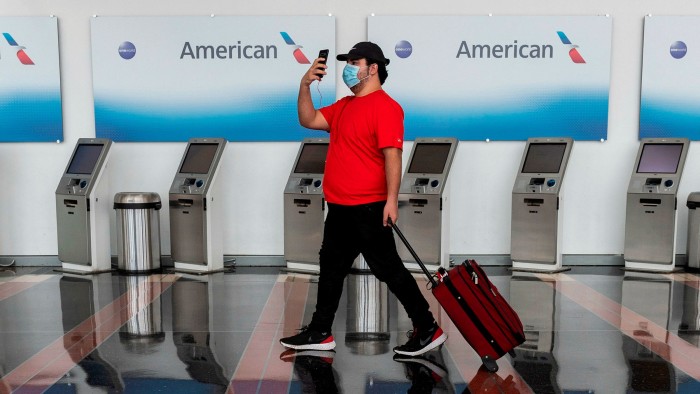Lex letter from the US: make way for foreign travellers

Simply sign up to the Airlines myFT Digest -- delivered directly to your inbox.
Dear readers,
The WhatsApp messages are coming in thick and fast these days. Ever since the Biden administration announced in September that vaccinated foreign travellers would be allowed to enter the US from Monday next week, friends from abroad have wasted no time submitting their couch-surfing requests.
Overseas visitors will still require proof of vaccination and a negative Covid-19 test taken within three days of their departure in order to travel. But that is a minor inconvenience for families separated for the past 19 months by the travel ban.
Businesses can also rejoice. The new policy — coming ahead of the holiday season — should give a welcome boost to industries, ranging from retail to travel. The latter’s recovery lost some of its momentum last quarter amid the rise of the fast-spreading Delta variant of Covid. But early signs look encouraging.
Hopper, a travel booking site, enjoyed a 160 per cent jump in bookings for round-trip flights from Europe to the US on the day the White House announced its easing of the travel freeze. Searches for transatlantic flights jumped 133 per cent in the week after the announcement.
Travellers from Europe have historically provided an important source of revenue. They accounted for roughly 43 per cent of the total traffic in the north Atlantic market in 2019, and 40 per cent of passenger revenues, according to the International Air Transport Association.

Almost 80m foreign travellers visited the US in 2019 and spent nearly $179bn on goods and services, according to the US Travel Association. The figure collapsed to $38.1bn last year as a result of the pandemic.
Among the beneficiaries from the return of overseas visitors is Airbnb. Shares in the home rental platform are up 7 per cent since the news, taking the gains for the year to almost a quarter. Before the pandemic, almost half of the stays booked on Airbnb were for cross-border, or international, travel.
Investors will get a better sense of any travel recovery on Thursday when Airbnb reports its third-quarter results. A key number will be the gross booking value. In the second quarter, Airbnb reported a gross booking value of $13.4bn. Not only did that jump 320 per cent over the same period last year, more importantly, it was 37 per cent higher than the same quarter in 2019.
On the other hand, more transatlantic travel — and the rebound in global greenhouse gas emissions following a record decline last year — will dismay climate change activists.
Then again, other events may conspire against airlines. In recent weeks, two large US carriers have had to cancel thousands of flights as a result of bad weather and staffing shortfalls. American Airlines has cancelled more than 2,300 flights since last Friday. It follows similar disruptions at Southwest Airlines in October. These forced cancellations raise questions about whether leading airlines can even meet the rising demand, especially during the all-important period between Thanksgiving and new year.
At the heart of the problem is a worker shortage. Airlines could not lay off workers during the pandemic as a condition of billions of dollars in federal pandemic relief they received. But that didn’t stop them from persuading thousands of employees to take early retirement or voluntary leave. Now airlines must scramble to fill positions for everything from pilots and flight attendants to gate agents and baggage handlers.
Airlines say that recruiting has stepped up. But they compete for workers in a market with a record number of job vacancies. The NYSE Arca Airline index has dropped almost 13 per cent since the start of October and remains about 27 per cent below its pre-pandemic level. Investors are right to be sceptical. Not even the return of international travellers could breathe life into airline stock prices.
Have a good rest of the week.
Pan Kwan Yuk
Lex writer
If you would like to receive regular updates whenever we publish Lex, do add us to your FT Digest, and you will get an instant email alert every time we publish. You can also see every Lex column via the webpage
Comments